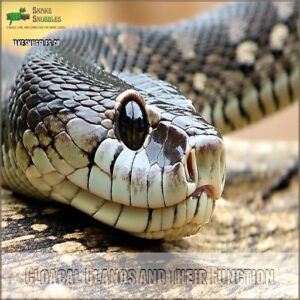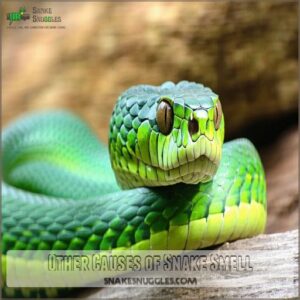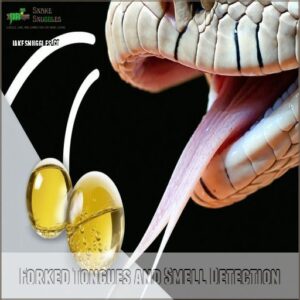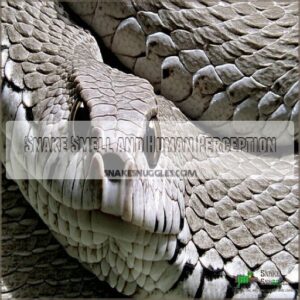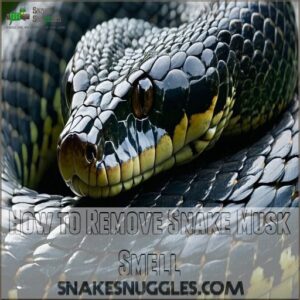This site is supported by our readers. We may earn a commission, at no cost to you, if you purchase through links.
 You’d probably turn your nose up if a snake slithered by, thanks to their signature stench of rotten eggs or pungent urine.
You’d probably turn your nose up if a snake slithered by, thanks to their signature stench of rotten eggs or pungent urine.
It’s a unique defense mechanism snakes use to scare off predators.
They produce this foul-smelling musk from glands near their tail vent.
The strong odor serves as an effective warning sign, and some other creatures have even evolved to mimic this unpleasant smell for similar protection.
Understanding the biology behind why snakes smell this way can shed light on their fascinating survival tactics and key role in the ecosystem.
There’s more to this stinky story than meets the nose!
Table Of Contents
- Key Takeaways
- Smelly Snakes and Their Unique Traits
- Why Snakes Smell Like Urine or Rotten Eggs
- The Biology of Snake Smell
- Snake Smell and Human Perception
- Snake Smell and Behavior
- How to Remove Snake Musk Smell
- Snake Smell and Ecological Role
- Snake Smell and Predator Avoidance
- The Unique Olfactory System of Snakes
- The Importance of Preserving Snake Populations
- Frequently Asked Questions (FAQs)
- Do snakes smell like rotten eggs?
- Do snakes give off a urine smell?
- What smell does a copperhead give off?
- What snake smells like sewage?
- What are some tips for safely removing snakes from my property?
- Is the rotten smell from snakes harmful or dangerous to inhale?
- Can snake smell be harmful to humans?
- How do snakes use smell for hunting?
- Why do some snakes have stronger odors?
- How long does snake musk smell last?
- Conclusion
Key Takeaways
- Snakes have special glands that produce a foul-smelling musk they release when threatened as a defense mechanism to scare off predators.
- A snake’s sense of smell is incredibly sophisticated, allowing them to detect scents in 3D using their forked tongues and vomeronasal organs to navigate their world, communicate, and hunt.
- While some people find the snake’s rotten egg or urine-like odor unpleasant, it’s simply part of their unique biology and role in the ecosystem as a predator that helps regulate small animal populations.
- You can safely remove the snake smell from your skin or surfaces using a simple hydrogen peroxide and baking soda mixture, and maintaining a clean snake habitat is key to managing any lingering odors.
Smelly Snakes and Their Unique Traits
You might be surprised to learn that snakes have a few tricks up their sleeves – or, more accurately, in their tails!
Eastern Hognose
Some snakes, like the distinctive Eastern Hognose, are known for their potent rotten egg-like stench, which they release to scare off predators. It’s just one of the many unique traits that make these slithery creatures so fascinating.
Characteristics of Eastern Hognose Snakes
Imagine the Eastern Hognose Snake as nature’s trickster, sporting an upturned snout like a quirky nose job.
This snake specializes in mimicry, often acting dead or emitting a rotten egg scent to confuse predators.
Though harmless, its antics are legendary.
Preference for sandy soils and a diet mainly of toads make its habitat choices fascinating and purposeful.
The Role of Smell in Snake Defense
Eastern Hognose Snakes have their smelly moments.
Their rotten egg scent is more than just alarming—it’s like these snakes were chemistry whizzes in a past life.
This snake musk evolution isn’t a trivial matter; it’s a masterful chemical warfare tactic.
Here’s why:
- Predator avoidance
- Scent mimicry
- Defensive adaptation
- Chemical defense mechanism
Who knew smelling bad could be so smart?
Other Animals That Mimic Snake Smell
While snakes use their infamous rotten egg smell to scare off predators, some critters have evolved to mimic this stench too.
This defense mechanism is similar to a snake’s musk, which is secreted from cloacal glands near the tail vent.
Skunk beetles, certain frogs, and even some lizards all release pungent odors that resemble a snake’s musk.
This sneaky defense mechanism lets them camouflage their scent and avoid becoming a snake’s next meal.
Why Snakes Smell Like Urine or Rotten Eggs
Ever wondered why snakes sometimes smell like rotten eggs or urine?
It turns out they’ve a unique defense mechanism – special glands that produce a foul-smelling musk to deter predators.
You’ll be amazed by the secrets behind a snake’s smelly superpower!
Cloacal Glands and Their Function
Snakes have a special set of glands called cloacal glands near their rear end, which vary in structure across different species and are responsible for producing a complex mixture of chemicals.
These glands produce a foul-smelling musk that snakes release when threatened, such as when they’re using snake musk as defense.
The stench, often described as rotten eggs or urine, is a defense mechanism to scare off predators.
By understanding how these glands work, you can better appreciate the unique biology of these slithery creatures.
Types of Smells Produced by Snakes
Ever wondered why snakes sometimes smell like rotten eggs or even urine? It’s all about their clever use of scents.
- Musk Scent: Smelly secretions to deter predators.
- Snake Urine: Often mistaken for musk.
- Defensive Secretions: Think of it like spraying an offensive perfume.
- Chemical Communication: Like leaving a scented "post-it" note.
- Predator Deterrence: Smells that scare others away.
Other Causes of Snake Smell
There are a few other reasons why your slithery serpent might be giving off a less-than-savory scent.
Diet issues, stress, infections, and poor tank hygiene can all lead to funky odors.
Just like us, snakes need proper nutrition and a clean home to stay healthy and smelling fresh.
Time to give that tank a deep clean!
| Cause | Solution |
|---|---|
| Diet | Provide a balanced, nutritional diet |
| Stress | Reduce environmental stressors |
| Infection | Seek veterinary care |
| Hygiene | Maintain a clean, well-ventilated habitat |
The Biology of Snake Smell
You might be wondering how snakes can produce such unpleasant smells.
Don’t worry, we’ll explore the biology behind their unique olfactory system and reveal the secrets behind those rotten egg or urine-like scents.
Vomeronasal Organ and Its Importance
Got a nose for snakes?
Their secret lies in the vomeronasal organ, a specialized structure that lets them pick up on all sorts of scents.
But did you know that a snake’s actual smell is often a result of poor enclosure maintenance habits.
This mini-nose inside their actual nose acts like a 3D smell detector, helping snakes navigate their world through scent alone.
Pretty cool, huh?
Forked Tongues and Smell Detection
Your snake’s forked tongue is a marvel of evolution! Those two prongs sample the air, picking up scent molecules that are then processed through its highly specialized vomeronasal organ. This gives snakes a three-dimensional scent map, allowing them to navigate their world, find prey, and communicate with each other using their nose more than their eyes.
For instance, certain products like snake smell urine eliminators can be found online to help neutralize any unpleasant odors associated with pet snakes snake smell urine products.
- Forked tongues allow snakes to detect scents in 3D
- Snakes use their tongues to "taste" the air and gather information
- The vomeronasal organ in a snake’s mouth interprets these scent signals
- Snakes can determine the direction and distance of odor sources
- Scent plays a key role in snake behavior, communication, and survival
How Snakes Process Smell Information
Snakes’ ability to process scents relies on their unique anatomical features.
Their forked tongues gather odor molecules, which then get transported to the vomeronasal organ.
This organ helps snakes interpret smells and 3D map their surroundings.
Snakes primarily "see" their world through smell, using it to detect prey, communicate, and avoid predators.
Pretty nifty, right?
Snake Smell and Human Perception
While some may find the scent of snakes unpleasant, your personal perception is likely shaped by a mix of cultural influences and past experiences.
Don’t let a little stink stop you from appreciating these fascinating reptiles – their unique odor is all part of what makes them so special!
Factors Affecting Human Perception of Snake Odor
The way we perceive snake odor can vary greatly. Our past experiences, cultural beliefs, and personal preferences all play a role in how we interpret that rotten egg or urine-like scent. Some may find it repulsive, while others are more tolerant. Your individual sensitivity to smells also factors into how the snake’s defensive musk affects you.
- Past experiences can shape your perception
- Cultural beliefs influence how you view snake odor
- Personal preferences determine your tolerance level
- Individual sensitivity to smells impacts how the scent affects you
Cultural and Personal Preferences
Ever wondered why some folks are unfazed by the scent of snake musk while others steer clear, clutching their noses?
Cultural perceptions and personal experiences play a big part.
Maybe your grandmother always warned you about "rotten eggs" in the garden, shaping your aversion.
Sensory sensitivity also varies, making snake smells more noticeable to some.
It’s all about the nose!
Why Some People Hate Snake Smell
Many folks find that snake musk smell downright horrid – a pungent combo of rotten eggs and urine that sets their teeth on edge.
This visceral reaction often stems from personal experiences, cultural beliefs, or just plain heightened sensory sensitivity.
But hey, not everyone’s a fan of that musky snake scent.
To each their own, right?
Snake Smell and Behavior
Snakes have a remarkable sense of smell that guides their behavior in fascinating ways.
You’ll be amazed at how they use their keen olfactory skills to communicate, mark their territory, and navigate their environment.
Communication and Mating
Snakes use scent signals to communicate, especially during mating season.
Their forked tongues pick up pheromone trails left by other snakes, helping them locate potential mates.
This chemical communication allows the snakes to engage in intricate courtship rituals, ensuring successful reproduction.
Understanding these unique mating behaviors sheds light on the fascinating world of these often-misunderstood reptiles.
Territorial Marking and Scent Trails
For snakes, their sense of smell plays a crucial role beyond just using it to hunt.
Snakes actually use their potent scent to mark their territories and leave trails for others to follow, and you can even find products online that capture these smells, such as those found at snake scent products.
This pungent musk helps them communicate, find mates, and steer clear of potential predators.
Pretty clever, right?
The Role of Smell in Snake Navigation
Beyond leaving scent trails to mark their territory, snakes actually rely on their incredible sense of smell to navigate the world around them.
Their forked tongues and specialized vomeronasal organs allow them to:
- Detect prey from miles away
- Recognize landmarks for finding their way
- Avoid predators by sensing danger
- Locate potential mates through pheromones
- Find food sources with pinpoint accuracy
How to Remove Snake Musk Smell
Got a stinky snake on your hands?
No need to hold your nose!
Just whip up a quick tomato juice or baking soda bath to kick that funky musk to the curb.
Trust us, your nose (and your snake) will thank you.
Using Tomato Juice and Hydrogen Peroxide
Ever dealt with that truly awful smell?
Tomato juice can mask the stench, but for serious snake musk removal, a hydrogen peroxide and baking soda mix is your best bet.
This DIY solution tackles the problem head-on!
It’s great for skin and surfaces.
| Method | Effectiveness | Ease of Use | Safety | Cost |
|---|---|---|---|---|
| Tomato Juice | Low | High | High | Low |
| H2O2 & Baking Soda | High | Medium | Medium | Low |
| Commercial Cleaners | High | High | Varies | High |
| Home Remedies | Varies | Varies | Varies | Varies |
| Nothing | None | N/A | N/A | N/A |
Cleaning Snake Cages and Accessories
Regularly cleaning your snake’s habitat is key to managing musk odors.
Swap out the substrate monthly, pick up waste daily, and scrub the water bowl frequently.
Use mild, pet-safe cleaners like vinegar and baking soda – avoid harsh chemicals that could harm your scaly friend.
With some elbow grease, you can keep your snake’s pad fresh and funk-free.
Removing Snake Smell From Skin and Surfaces
Removing snake smell from your skin or other surfaces can be a stinky situation.
But no need to worry – a simple hydrogen peroxide and baking soda mixture can blast that rotten egg odor right off.
Just scrub it on and let the fizzy magic work its wonders.
No more nose-pinching, we promise!
Snake Smell and Ecological Role
Snakes may smell like urine or rotten eggs, but don’t let that fool you – their distinctive aroma actually serves an important purpose in the ecosystem.
By controlling small animal populations, these slithery creatures help maintain a healthy balance in their environment.
Eastern Hognose Snakes and Their Prey
As an Eastern Hognose Snake slithers through the undergrowth, it’s on the hunt for its favorite prey – toads.
These snakes use their distinctive upturned snout to dig into the earth and unearth their amphibious targets.
Their ability to regulate small animal populations plays a key role in maintaining the delicate balance of their ecosystem.
The Importance of Snakes in The Ecosystem
Snakes play a key role in maintaining the balance of nature.
As essential predators, they help control populations of small animals like rodents and toads.
Their presence is a sign of a healthy ecosystem, contributing to biodiversity.
So the next time you catch a whiff of that rotten egg smell, appreciate the important job these slithering critters do!
How Snakes Regulate Animal Populations
Eastern Hognose snakes play a key role in regulating their ecosystem.
By feasting on toads, rodents, and other small critters, these remarkable reptiles help maintain a healthy balance.
Their presence is important for controlling pesky populations that can otherwise spiral out of control, ensuring the overall ecological harmony.
- They prey on common nuisance animals
- Their appetite helps curb rodent infestations
- They promote biodiversity by preventing overpopulation
- Their role in the food web is indispensable
Snake Smell and Predator Avoidance
Have you ever wondered why snakes sometimes emit a foul odor that smells like rotten eggs or urine?
This unique defense mechanism helps snakes avoid becoming a tasty meal for hungry predators.
By releasing their stinky secret weapon, snakes can scare off would-be attackers and live to slither another day.
How Snakes Use Smell to Avoid Predators
Their unique sense of smell helps snakes steer clear of predators.
By detecting alarm pheromones and picking up on potential threats with their forked tongues, snakes can quickly assess danger and respond, including releasing sulfur-like defense odors.
Whether it’s camouflage, hissing, or tail-whipping, snakes have an impressive arsenal of defensive tactics to keep themselves safe.
Other Defense Mechanisms Used by Snakes
When snakes feel threatened, they’ve got more tricks up their sleeve than just smelling like rotten eggs.
Flattening their necks, hissing menacingly, and even playing dead are some of the ways these slithery reptiles try to scare off predators.
Their camouflage skills and venomous bites are also formidable defenses.
It’s all part of the snake’s survival toolkit!
The Unique Olfactory System of Snakes
Did you know snakes have a super-sniffing superpower?
Their unique olfactory system allows them to detect scents we can’t even imagine.
You’ll be amazed at how these slithery creatures use their forked tongues and vomeronasal organs to navigate the world through smell.
The Jacobson’s Organ and Its Function
An intriguing part of a snake’s unique olfactory system is the Jacobson’s organ.
This specialized structure, located on the roof of their mouth, helps snakes detect and process subtle chemical cues from their environment.
By picking up scent particles, the Jacobson’s organ provides snakes with important sensory input about their surroundings, prey, and potential threats.
How Snakes Use Their Sense of Smell
Snakes rely heavily on their exceptional sense of smell to navigate the world around them.
Their forked tongues pick up scents in the air, which are then analyzed by their vomeronasal organ, providing a 3D perception of their environment.
This allows them to track prey, locate mates, and mark their territory with scent trails.
The Importance of Smell in Snake Biology
Snakes’ noses are more than just a pretty face – they’re highly sophisticated scent machines!
Their forked tongues and Jacobson’s organ let them detect and process smells with incredible accuracy.
This super sniffer ability allows snakes to navigate their world, track down prey, and communicate with each other like little scentmasters.
Pretty neat, huh?
The Importance of Preserving Snake Populations
Snakes may seem unappealing, but they play a critical role in our ecosystems.
Without these slithery creatures, small animal populations would quickly get out of control, disrupting the delicate balance of nature.
Why Snakes Are Important in The Ecosystem
Did you know snakes play a vital role in keeping ecosystems balanced?
As top predators, they help control rodent and small animal populations, preventing overpopulation.
For humans who live in areas with snake populations, it’s important to take precautions with snake defense products like Chewy snake defense.
Their presence is key for maintaining a healthy food web and preserving biodiversity.
Plus, their unique defense mechanisms, like releasing that stinky musk, protect them from larger threats – keeping the circle of life in check.
Threats to Snake Populations
Unfortunately, the charismatic Eastern Hognose snake faces a barrage of threats that put its survival at risk, including the challenges of thriving in urban environments, where their habitats are altered by factors such as food availability and urban snake populations city parks.
From habitat loss and climate change to reckless pesticide use and illegal wildlife trade, their numbers are dwindling.
But with greater awareness and conservation efforts, we can safeguard these unique reptiles and the important roles they play in maintaining healthy ecosystems.
Conservation Efforts and Protecting Snakes
Protecting snake populations is essential for maintaining ecological balance.
Many conservation efforts, like habitat restoration and anti-poaching initiatives, help safeguard these fascinating creatures.
You can support snake conservation by:
- Donating to reputable snake conservation organizations.
- Participating in snake education programs in your community.
- Advocating for strong laws and policies to protect snake habitats.
- Reporting any suspected cases of snake poaching or illegal wildlife trade.
By taking these steps, you can help make sure that these unique, misunderstood animals continue to thrive in the years to come.
Frequently Asked Questions (FAQs)
Do snakes smell like rotten eggs?
Hold your nose, folks!
Snakes can release a downright rotten egg-like stench when threatened, thanks to their special glands.
But don’t worry – this smelly defense mechanism is just their way of keeping you at bay.
Do snakes give off a urine smell?
You bet – snakes can definitely give off a urine-like odor.
This pungent smell comes from special scent glands they use for defense, not because they’re marking territory or going to the bathroom.
Don’t worry, it’s totally normal snake behavior!
What smell does a copperhead give off?
Copperheads are notorious for their potent musky odor – kinda like a mix of ripe onions and rotten eggs.
Definitely not the most pleasant aroma, but it’s their way of telling predators to back off.
What snake smells like sewage?
Oh, that’s no pleasant whiff!
The stinky Eastern Hognose Snake lets out a potent rotten egg scent when threatened, like a skunk spraying to scare off foes.
It’s all part of this snake’s quirky defense mechanisms.
What are some tips for safely removing snakes from my property?
Stay calm, keep your distance, and call in the pros if you spot a snake on your property.
Snakes can play dead, so it’s best not to take any chances – let the experts safely remove them.
Is the rotten smell from snakes harmful or dangerous to inhale?
Don’t fret, friend – that rotten snake stench isn’t hazardous to inhale.
It’s just their defense mechanism kicking in.
Just give those slithery critters some space, and the odor will dissipate in no time.
Can snake smell be harmful to humans?
No need to worry – that rotten snake smell won’t do you any harm.
It’s just their way of saying "back off, buddy!"
Rest easy, their stench is all bark and no bite.
How do snakes use smell for hunting?
Forget what you’ve heard – snakes aren’t just coiled predators, they’re expert hunters who use their keen sense of smell to track down prey.
With forked tongues, they can detect scents in 3D, giving them a huge advantage in the wild.
Why do some snakes have stronger odors?
Well, some snakes have a stronger odor ’cause their scent glands pack more punch.
It’s like their natural skunk spray, a built-in stink bomb to scare off predators.
Pretty nifty defense mechanism, if you ask me!
How long does snake musk smell last?
The pungent snake musk smell can linger for several hours.
It’ll eventually fade as the oils and compounds dissipate.
Just give it some time, and the unpleasant odor will go away on its own.
Conclusion
Now that you know the secrets behind why snakes have such a distinctive odor, aren’t you just a bit more curious about these fascinating creatures?
Sure, their stench may not win any awards, but it’s an integral part of how snakes survive and thrive in the wild.
So the next time you come across a why do snakes smell like urine or rotten eggs, remember – it’s just their way of saying "hands off!" in the most pungent way possible.


